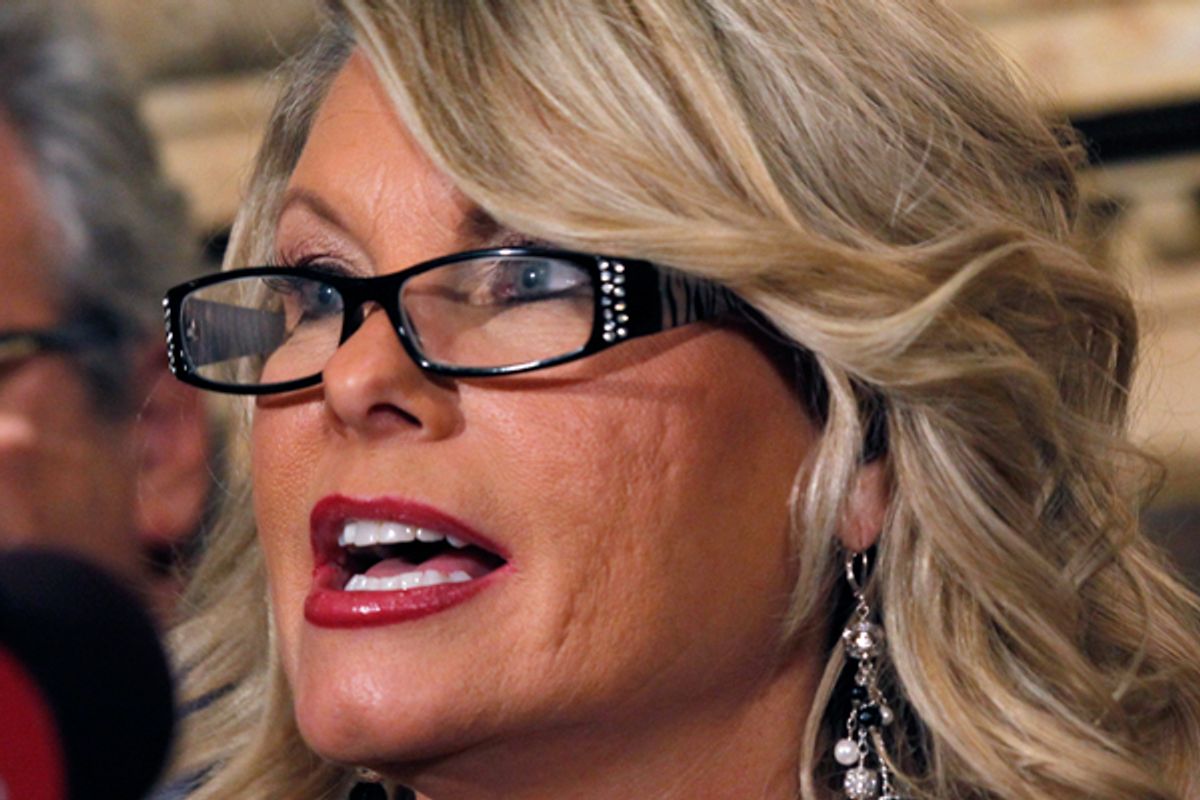Sharon Bialek, the woman who went public to accuse Herman Cain of sexual harassment and assault, peppered her prepared statement with a dozen strategic references to her former boyfriend to drive home the point that the Republican presidential candidate's advances had been unwanted. In a seven-minute statement, Bialek mentioned her boyfriend every 40 seconds.
The boyfriend was the reason she called up Cain to use him as a possible contact for a job. It was he who suggested she meet Cain, in person, thereby explaining why she would be alone having drinks and dinner with a strange man. This boyfriend (a doctor!) was the plausible explanation for her room upgrade at the Capitol Hilton. He was the reason she rebuffed Cain's alleged sexual overtures.
Bialek and her legal team wanted no confusion about that fact that she was in a serious relationship and not looking for a date with Cain, a married man who has denied the allegations against him. But does a woman need a husband or boyfriend to be taken seriously when bringing allegations of sexual misconduct? Would Bialak’s account of meeting Cain draw more doubt or scrutiny had she not had a knight in shining armor waiting for her at home?
The marital status of a woman bringing allegations of sexual misconduct has been raised before, even if it’s not legally condoned. When seeking to complain, whether to a manager, human resources, authorities or even friends, victims have been told that their actions must have been “misinterpreted.” The implication is that single girls should just face the fact that they are fair game.
Alexis Moore, a California-based consultant and privacy expert, said she was sexually harassed at the age of 17 during her first job as a bagger at a grocery store. Her manager followed her through aisles, trying to rub against her, smell her hair or dole out lecherous comments. When she had finally had enough, Moore said, “I did report it but the store manager took me into the office and said, ‘Oh you’re a pretty girl. And single. These things happen.’"
Moore's response: "You know, I am an attractive lady but there’s no excuse for unwanted advances from a pervert.”
Christopher Olmsted, a discrimination attorney in San Diego, said no lawyer would ever invoke a woman’s marital status in defending a client against sexual harassment. But he concedes that when you “talk about what people’s subconscious predispositions and stereotypes might be, you might say that the general public might have a perception that a young, attractive single woman might be more inclined to be open to romantic overtures than an older woman, married or in a committed relationship. But there’s all sorts out there and there’s married people who are philandering and there’s single people who are not interested in any sort of relationship with colleagues.”
So in the court of public opinion, celebrity attorney Gloria Allred was determined to have her client’s motives clear for doing something as outlandish as have dinner with a man she hardly knew.
“I think that’s what angered me as a sexual harassment victim,” said Moore, who now also works as an advocate for women who have been harassed. “It’s so offensive. It doesn’t matter if I have 12 boyfriends or if I’m single on Match.com. Or if I’m a lesbian, for that matter. It really angered me that she had to keep repeating that [she had a boyfriend] in order to defend herself to 'establish credibility' or perhaps to be perceived as a real victim.”
Joshua Parkhurst, an employment attorney in New York City, points out that Bialek is not bringing a lawsuit against Cain but is seeking to fight any effort to delegitimize her character or motive. “She’s not an active litigant in a case. She’s making an appeal to public opinion,” he said.
Parkhurst said that women seeking to expose their alleged harasser will often find themselves in a system that is unwilling to investigate or inclined to believe a "misunderstanding" had occurred. “I’ve found that in some cases where the harassment has been reported to HR, rather than attempting to perform a bona fide investigation, HR will look for alternative explanations. I don’t want to paint with too broad a brush, but often it will come back [to an accuser] that 'maybe you were just flirting.’ Or ‘he was just joking.’”
Abigail Saguy, a UCLA professor and author of "What Is Sexual Harassment?," described Bialek’s statement as an attempt to combat skeptics who are “only too eager to disbelieve a woman’s real motive.”
“She is responding to a reality. Establishing that she had other relationships is one strategy for showing that the advancements were unwelcome, which is not a legal criteria in sexual harassment law but it is something that would be important to convince either a jury or people more publicly," Saguy said.
Women who come forward with allegations of sexual harassment often see their character and personal life scrutinized in an effort to establish their motive or believability. But in 2011, a woman’s marital status doesn’t seem like a precise instrument for assessing her overall credibility.



Shares